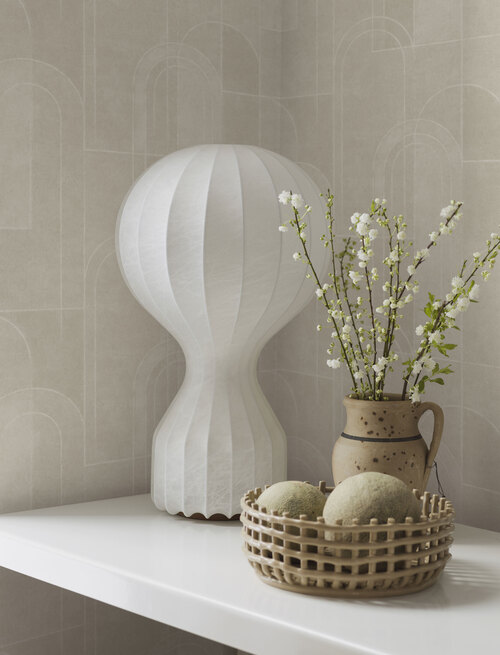
six popular eras
ALLA TIDERS HUS
Explore our expertly crafted wallpaper collection which captures and enhances the spirit of houses built in six popular eras. Two beautiful patterns for each period house, from the late 19th century to the present day.

A mix of designs from houses through time, carefully chosen to match modern life and the age of your home.
Alla Tiders Hus enables you to dress the walls of your living room or bedroom with floral and geometric wallpaper which honours the authentic character of your house.
“A timeless yet contemporary collection of 35 wallpapers celebrating houses through time. Florals, graphics and colourful styles by leading Scandinavian wallpaper designer Boråstapeter.”
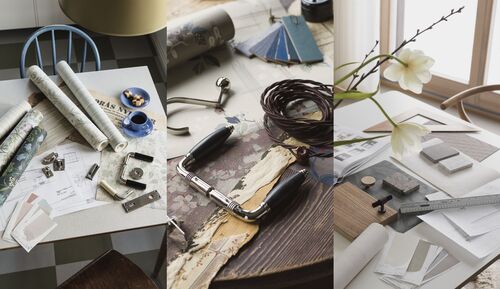

THE TURN-OF-THE-CENTURY HOUSE
At the start of the 1900s, Swedish industry was thriving, and wallpaper prices decreased. Many people could afford to dress their homes with wallpaper. The wealthy built their houses on the city's outskirts and chose different wallpapers in every room to create an all-through lovely home. In smaller cottages, wallpaper became a popular option to dress up a modest interior. Palm leaf and stylised flower designs were the height of fashion.
Illustrations: Laila Reppen

THE TURN-OF-THE-CENTURY HOUSE
At the start of the 1900s, Swedish industry was thriving, and wallpaper prices decreased. Many people could afford to dress their homes with wallpaper. The wealthy built their houses on the city's outskirts and chose different wallpapers in every room to create an all-through lovely home. In smaller cottages, wallpaper became a popular option to dress up a modest interior. Palm leaf and stylised flower designs were the height of fashion.
Illustrations: Laila Reppen






Blossoming ornamentation

THE JUGEND VILLA
During the first years of the 20th century, a new and brighter style was trending in Europe. In Germany, it was called Jugendstil, and in France, Art Nouveau. In Sweden, the trend went hand in hand with Swedish romantic nationalism – looking back at the old days, taking inspiration from Swedish nature. Many homes were inspired by mansions and country estates, with higher ceilings and larger windows. A desire for a brighter, more spacious room meant the new airy and nature-inspired designs quickly grew in popularity.
Illustrations: Laila Reppen

THE JUGEND VILLA
During the first years of the 20th century, a new and brighter style was trending in Europe. In Germany, it was called Jugendstil, and in France, Art Nouveau. In Sweden, the trend went hand in hand with Swedish romantic nationalism – looking back at the old days, taking inspiration from Swedish nature. Many homes were inspired by mansions and country estates, with higher ceilings and larger windows. A desire for a brighter, more spacious room meant the new airy and nature-inspired designs quickly grew in popularity.
Illustrations: Laila Reppen

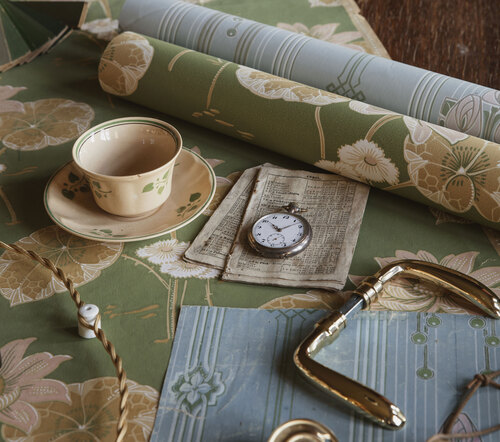
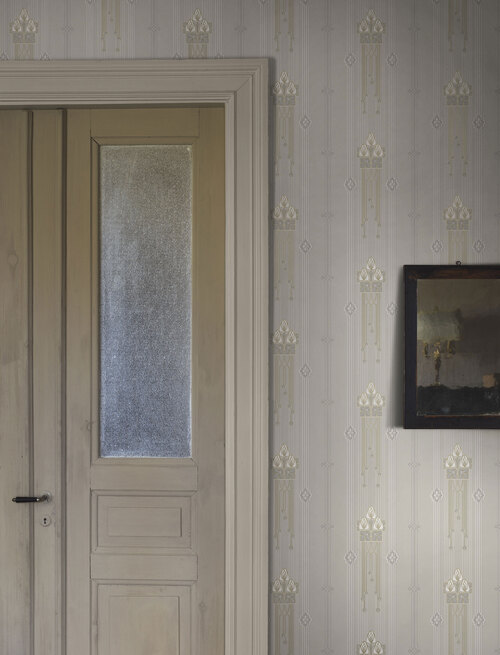



Sweeping shapes and bold styles

THE 1920S HOUSE
In the 1920s, the architecture went towards a more strict and clean expression. Symmetry and geometry, light and space were desired, while the past Art Nouveau and romantic nationalism style were seen as pompous. Wallpapers with lines and circles, graphic forms and stylised floral designs were sought after. Simultaneously a new oriental trend was growing, with eastern-inspired patterns. Wallpapers could dress every wall throughout the home, often with a brown or beige background as a cosy contrast to the austere architecture.
Illustrations: Laila Reppen

THE 1920S HOUSE
In the 1920s, the architecture went towards a more strict and clean expression. Symmetry and geometry, light and space were desired, while the past Art Nouveau and romantic nationalism style were seen as pompous. Wallpapers with lines and circles, graphic forms and stylised floral designs were sought after. Simultaneously a new oriental trend was growing, with eastern-inspired patterns. Wallpapers could dress every wall throughout the home, often with a brown or beige background as a cosy contrast to the austere architecture.
Illustrations: Laila Reppen







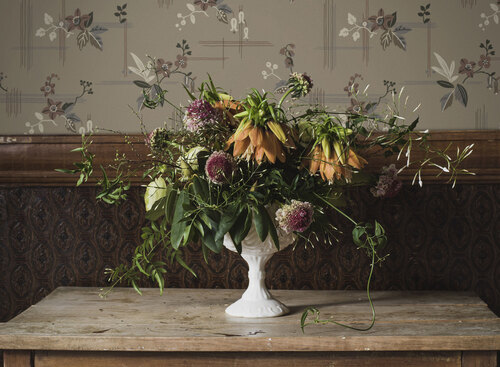
Classic symmetry in clean lines

THE MID-CENTURY HOUSE
During the 1930s, functionalism caught on in Sweden. Decorations with no function were seen as pointless; and instead, “clean and simple” became the motto. As the welfare state was emerging, functionalism grew softer and became more accessible. The lines were still clean and without frills, but the style also allowed for more cosiness. Built around the mid-century, this type of house often had a divided floor plan with separate rooms. This made it perfect for picking a variety of wallpapers and giving every room its own character.
Illustrations: Laila Reppen

THE MID-CENTURY HOUSE
THE MID-CENTURY HOUSE
During the 1930s, functionalism caught on in Sweden. Decorations with no function were seen as pointless; and instead, “clean and simple” became the motto. As the welfare state was emerging, functionalism grew softer and became more accessible. The lines were still clean and without frills, but the style also allowed for more cosiness. Built around the mid-century, this type of house often had a divided floor plan with separate rooms. This made it perfect for picking a variety of wallpapers and giving every room its own character.
Illustrations: Laila Reppen



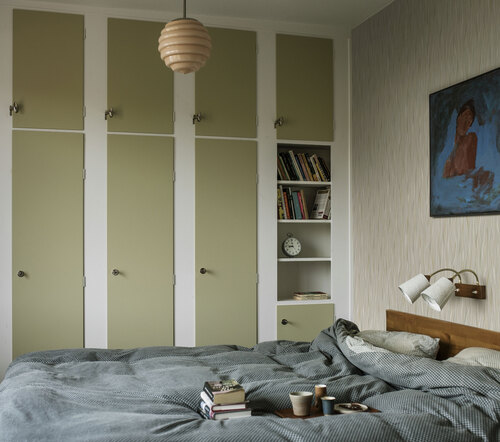
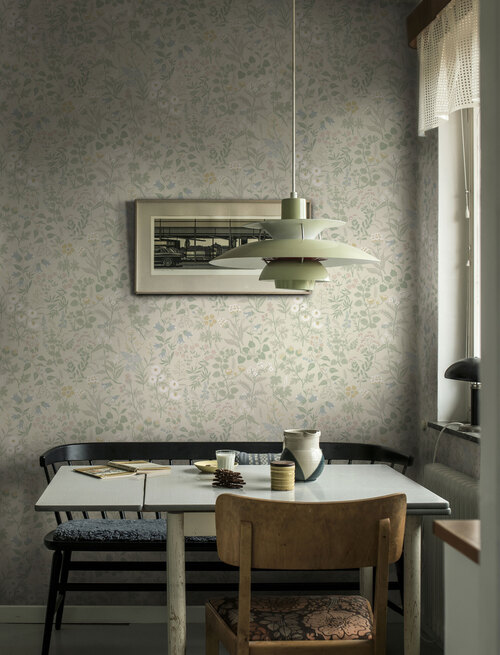

A softer functional

THE BRICK HOUSE
During the 60s and 70s, many houses were built in low-maintenance brick and whitewash, often combined with wood panels. The parlour is replaced by a more laidback living room for the whole family to hang out in. The floor plan is innovative, and rooms grow larger in size. Solid and functional are the focus. Subtle colour schemes complement today's modern life.
Illustrations: Laila Reppen
![]()
THE BRICK HOUSE
During the 60s and 70s, many houses were built in low-maintenance brick and whitewash, often combined with wood panels. The parlour is replaced by a more laidback living room for the whole family to hang out in. The floor plan is innovative, and rooms grow larger in size. Solid and functional are the focus. Subtle colour schemes complement today's modern life.
Illustrations: Laila Reppen

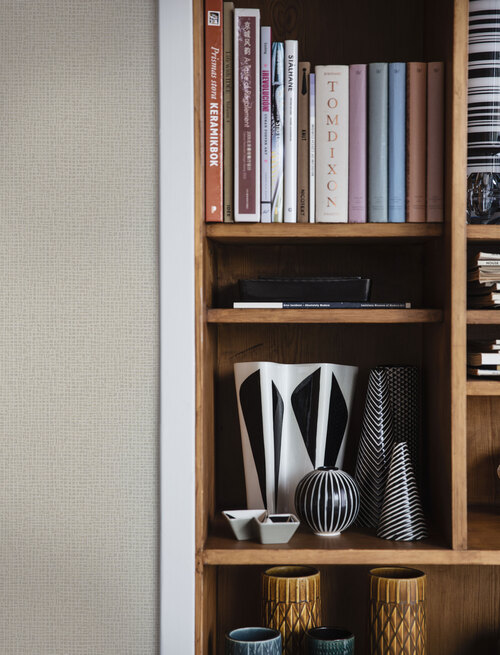



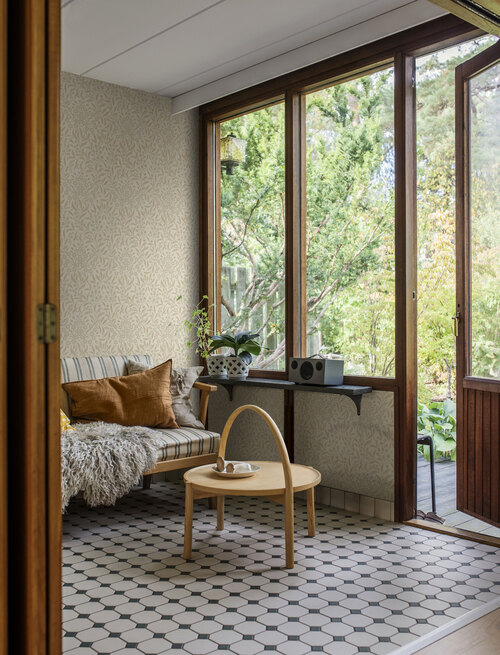
Down-to-earth with playful florals
THE NEW-BUILT HOUSE
The newly built house is often spacious with an open floor plan. Every room has multiple functions, and the wallpapers can often be seen from several angles in the home. This calls for a broad perspective when choosing wallpapers, patterns and colours. But it also gives amazing opportunities to add warmth and personality to strict architecture. An excellent way to accentuate a specific part of the living space is to frame it with patterned walls.
Illustrations: Laila Reppen

THE NEW-BUILT HOUSE
The newly built house is often spacious with an open floor plan. Every room has multiple functions, and the wallpapers can often be seen from several angles in the home. This calls for a broad perspective when choosing wallpapers, patterns and colours. But it also gives amazing opportunities to add warmth and personality to strict architecture. An excellent way to accentuate a specific part of the living space is to frame it with patterned walls.
Illustrations: Laila Reppen





